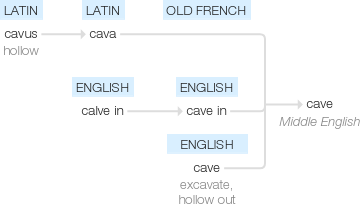Cave
Middle English: from Old French, from Latin cava, from cavus ‘hollow’ (compare with cavern). The usage cave in may be from the synonymous dialect expression calve in, influenced by obsolete cave ‘excavate, hollow out’.
wiktionary
From Middle English cave, borrowed from Old French cave, from Latin cava(“cavity”), from cavus(“hollow”). Cognate with Tocharian B kor(“throat”), Albanian cup(“odd, uneven”), Ancient Greek κύαρ(kúar, “eye of needle, earhole”), Old Armenian սոր(sor, “hole”), Sanskrit शून्य(śūnya, “empty, barren, zero”). Displaced native Old English sċræf.
Borrowed from Latin cavē, second-person singular present active imperative of caveō(“to beware”). Used at Eton College, Berkshire.
etymonline
cave (n.)
"a hollow place in the earth, a natural cavity of considerable size and extending more or less horizontally," early 13c., from Old French cave "a cave, vault, cellar" (12c.), from Latin cavea "hollow" (place), noun use of neuter plural of adjective cavus "hollow," from PIE root *keue- "to swell," also "vault, hole." Replaced Old English eorðscrafu.
cave (v.)
early 15c., caven, "to hollow something out," from cave (n.). Modern sense "to collapse in or down" is 1707, American English, presumably from East Anglian dialectal calve "collapse, fall in and leave a hollow," which is perhaps from Flemish and subsequently was influenced by cave (n.). Transitive sense by 1762. Related: Caved; caving. Figurative sense of "yield to pressure" is from 1837.
